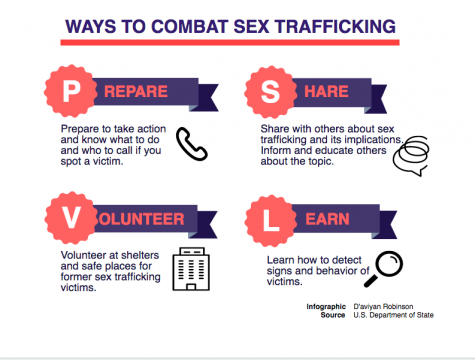Not for sale
Community members work to raise awareness, remove sex trafficking stigma
October 11, 2016
When 2016 alumna Alyssa Rauchman helped raise thousands of dollars with her church youth group to assist sex trafficked women last year, she felt surprised by how much change she could cause.
“My youth group at my church is made up of about 200 high schoolers and together we raised like $13,000 in a month,” Rauchman said. “We really do have the power to help even if people say we can’t or we don’t think we can.”
According to Christina Melander, research fellow at the University of Minnesota Urban Research and Outreach-Engagement Center (UROC), sex trafficking is a single branch under the umbrella term human trafficking.
“(Human trafficking) is essentially a third party who uses force, fraud or coercion to profit off of or to exploit the labor of someone. That can be sexual labor, like commercial sex; it can also be other things, too,” Melander said. “Sex trafficking is really one form of human trafficking. There’s a lot of ways somebody can be exploited for their labor, and sex trafficking is just one form.”
According to the Women’s Foundation of Minnesota (WFMN), upward of 50 percent of sex trafficking victims are runaway youth living on the streets, and more than 55 percent of girls living on the streets are sex trafficked.
Melander said although sex trafficking can be extremely hard to track and gather data for, young adults and marginalized groups are at the highest risk to become involved in sex trafficking networks.
“We do know that women and girls are affected more than men and boys. We know that other marginalized communities seem to be disproportionately affected by sex trafficking,” Melander said. “Racial and ethnic minorities, LGBTQ+ individuals, people with disabilities and people who are homeless tend to be affected more by sex trafficking.”
Junior Thomas Rainey said he believes the relative inability to accurately track sex trafficking makes it such a problem.
“It’s a problem in that it’s not monitored and so it leads to many opportunities for prostitution and otherwise bad business,” Rainey said.
Health teacher Allison Luskey said awareness plays a significant role in the prevention of sex trafficking.
“Awareness of the manipulation piece of sexualization and sexual exploitation is really important for people to know,” Luskey said. “Also, to practice being assertive, to practice ‘I’ messages, to practice standing up for yourself is really important, as well.”
Sophomore Anisa Ali said she hopes to see an increase in awareness in the Park community about sex trafficking.
“It’s not known in some places — it’s not as known as it should be,” Ali said.
Rauchman said widespread recognition of sex trafficking will allow people to contribute to a solution.
“I think I was really uneducated about (sex trafficking) before my church did this fundraiser, and I think it’s a problem — if we don’t know what’s happening how can we fix it?” Rauchman said.
According to Melander, the stigma surrounding sex trafficking and prostitution makes the crime even harder to track.
“It’s really hard for somebody who has been trafficked to know that they’re being trafficked because there might be layers of manipulation involved in that,” Melander said. “We need to reduce the stigma to let people come out and find a safe space to heal.”
Melander said researchers don’t currently see growth or decay patterns in sex trafficking, but increases in awareness and research make it seem more prevalent.
“We’re paying attention to (sex trafficking) now, so our awareness and our eyes on the ground are seeing sex trafficking happening more than previously,” Melander said. “We’re starting to see the problem and the effects of it more because people are starting to speak out, victims are starting to come forward and traffickers are getting prosecuted.”
Junior Wilson Tamay said he thinks people should be more aware of what happens in their community.
“(People) should (be aware of sex trafficking) because if you don’t know about it, you need to know more about what’s going on around you,” Tamay said.


